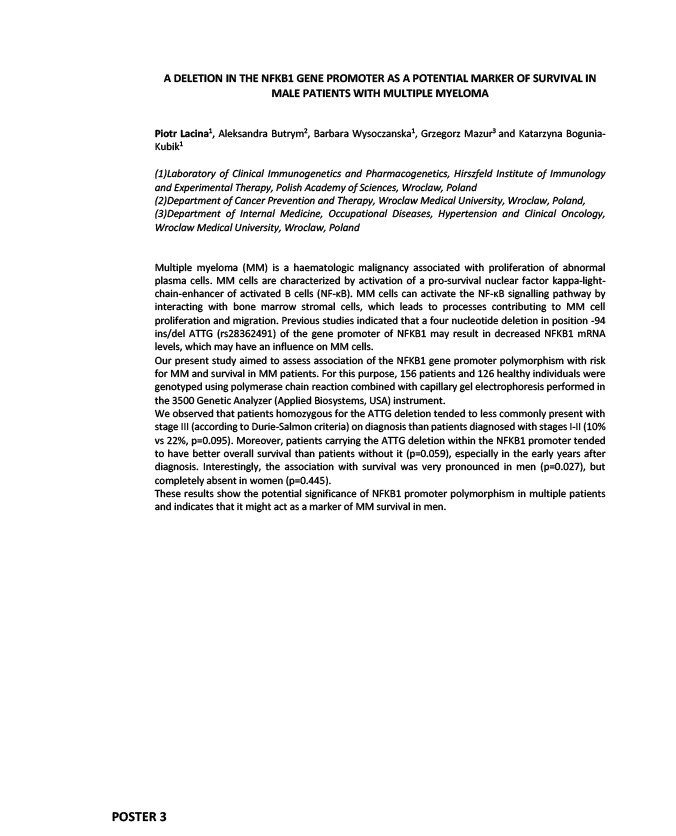
A DELETION IN THE NFKB1 GENE PROMOTER AS A POTENTIAL MARKER OF SURVIVAL IN
POSTER 3
MALE PATIENTS WITH MULTIPLE MYELOMA
Piotr Lacina1, Aleksandra Butrym2, Barbara Wysoczanska1, Grzegorz Mazur3 and Katarzyna Bogunia-
Kubik1
(1)Laboratory of Clinical Immunogenetics and Pharmacogenetics, Hirszfeld Institute of Immunology
and Experimental Therapy, Polish Academy of Sciences, Wroclaw, Poland
(2)Department of Cancer Prevention and Therapy, Wroclaw Medical University, Wroclaw, Poland,
(3)Department of Internal Medicine, Occupational Diseases, Hypertension and Clinical Oncology,
Wroclaw Medical University, Wroclaw, Poland
Multiple myeloma (MM) is a haematologic malignancy associated with proliferation of abnormal
plasma cells. MM cells are characterized by activation of a pro-survival nuclear factor kappa-light-chain-
enhancer of activated B cells (NF-κB). MM cells can activate the NF-κB signalling pathway by
interacting with bone marrow stromal cells, which leads to processes contributing to MM cell
proliferation and migration. Previous studies indicated that a four nucleotide deletion in position -94
ins/del ATTG (rs28362491) of the gene promoter of NFKB1 may result in decreased NFKB1 mRNA
levels, which may have an influence on MM cells.
Our present study aimed to assess association of the NFKB1 gene promoter polymorphism with risk
for MM and survival in MM patients. For this purpose, 156 patients and 126 healthy individuals were
genotyped using polymerase chain reaction combined with capillary gel electrophoresis performed in
the 3500 Genetic Analyzer (Applied Biosystems, USA) instrument.
We observed that patients homozygous for the ATTG deletion tended to less commonly present with
stage III (according to Durie-Salmon criteria) on diagnosis than patients diagnosed with stages I-II (10%
vs 22%, p=0.095). Moreover, patients carrying the ATTG deletion within the NFKB1 promoter tended
to have better overall survival than patients without it (p=0.059), especially in the early years after
diagnosis. Interestingly, the association with survival was very pronounced in men (p=0.027), but
completely absent in women (p=0.445).
These results show the potential significance of NFKB1 promoter polymorphism in multiple patients
and indicates that it might act as a marker of MM survival in men.